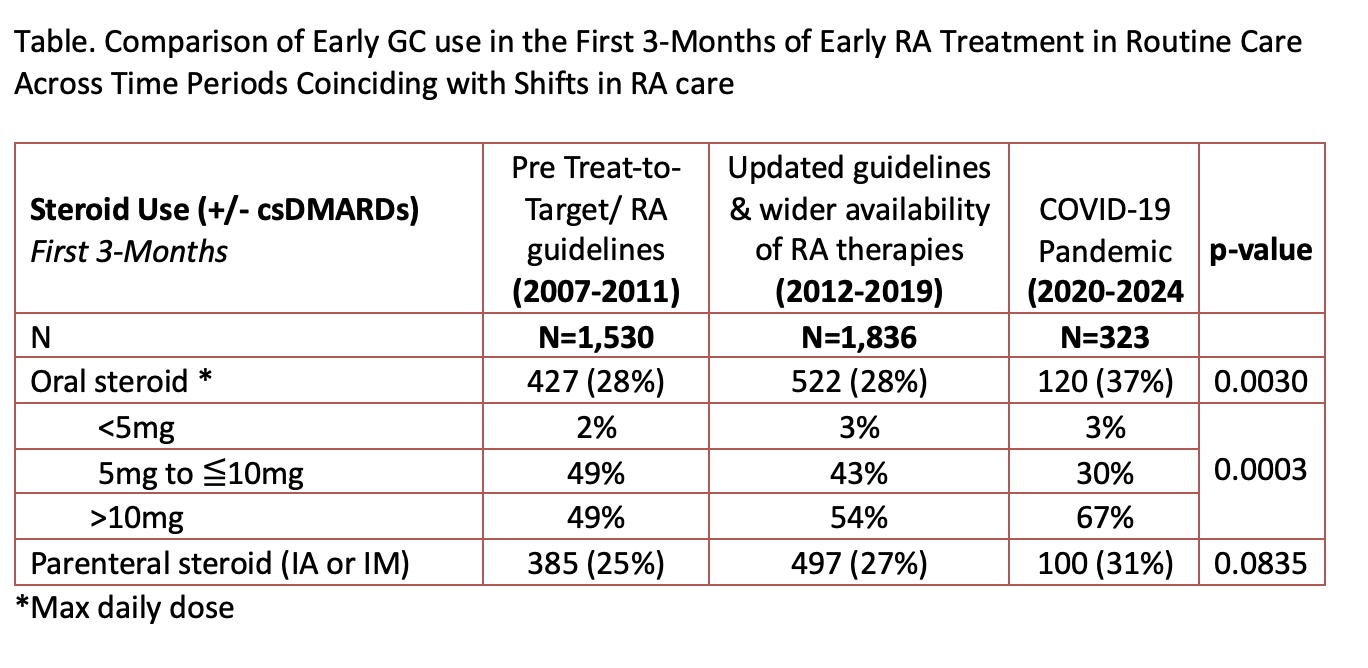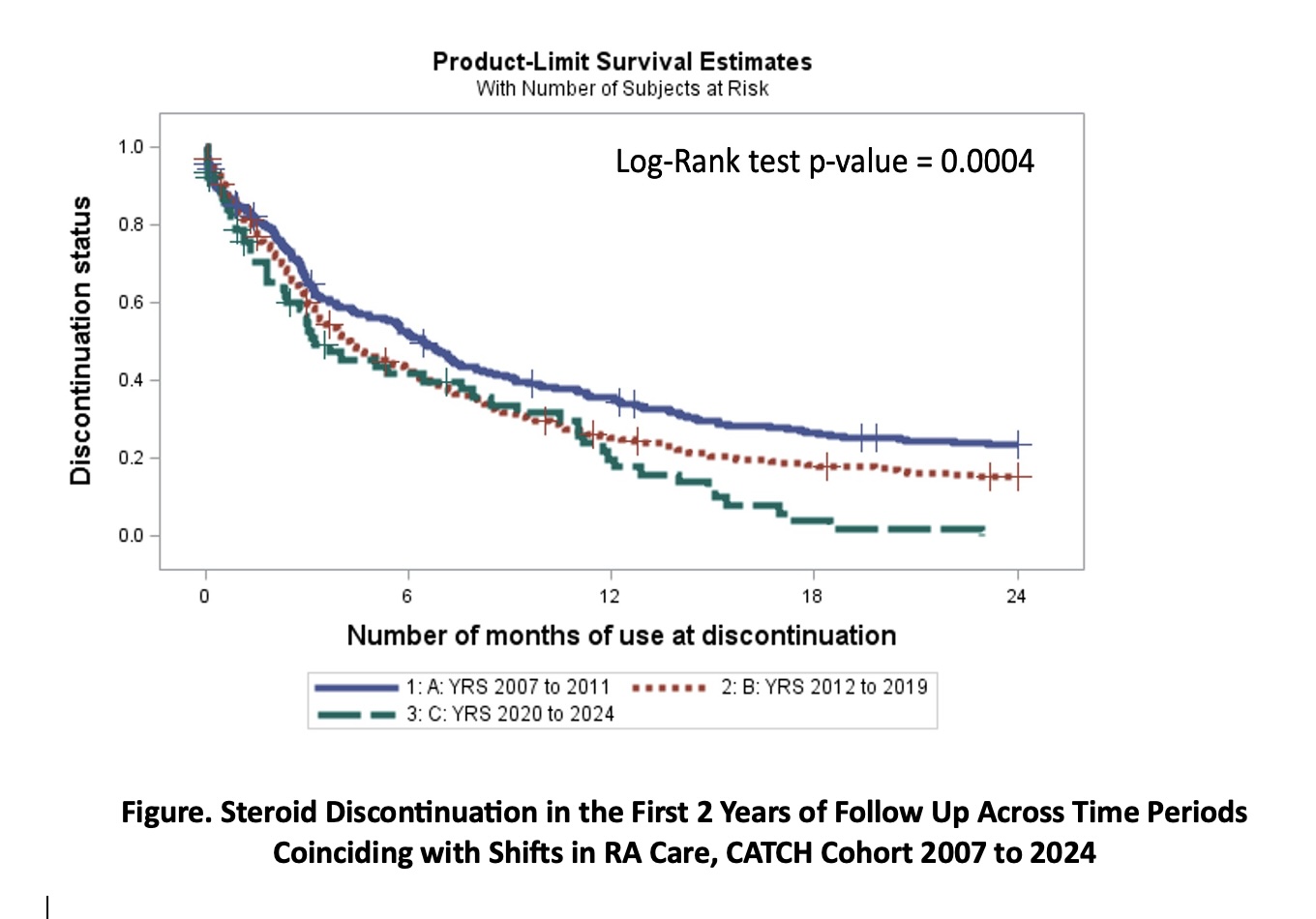Session Information
Date: Monday, November 18, 2024
Title: RA – Treatment Poster III
Session Type: Poster Session C
Session Time: 10:30AM-12:30PM
Background/Purpose: Increased availability of a wider array of effective RA treatments and evidence of glucocorticoid (GC)-related adverse events have prompted updated recommendations limiting GC use in early RA treatment. However, restricted access to rheumatology care during the COVID-19 pandemic may have intensified GC use. The objective of the present study was to examine time trends in initial GC treatment strategies for early RA patients seen in routine clinical practice across time periods coinciding with shifts in RA care: 1) Pre Treat-to-Target/ RA guidelines (2007-11); 2) Updated RA guidelines and broader availability of RA treatments including tsDMARDs and biosimilars (2012-19); and 3) COVID-19 Pandemic (2020-24).
Methods: Data were from adults with diagnosed or suspected early RA (symptoms < 1 year; 83% met RA classification criteria) seen in rheumatology clinics across Canada and enrolled in the Canadian Early Arthritis Cohort (CATCH) from 2007 to 2024. Participants completed standardized study visits including detailed RA clinical assessments, patient-reported outcomes, and laboratory investigations every 3 months for the first year, every 6 months in the second year, and annually thereafter. RA medication use was collected and verified by clinic staff, including glucocorticoid type, route, start and stop dates, and dosing. We compared frequency and dosing of early GC use in the initial 3 months of RA treatment across time periods using descriptive statistics and chi-square tests. Time to GC discontinuation over 2 years of follow up for each time period was visualized using Kaplan-Meier methods and compared using the log-rank test.
Results: The study included 3,689 early RA patients with a mean age of 55, 71% were female, 85% were White. Mean CDAI at enrolment was high at 25.4. Overall, 88% initiated treatment with csDMARDs (MTX-based strategies: 74%), 28% used oral steroids and 25% parenteral steroids (IA or IM). Early GC use in the first 3 months of early RA treatment was stable from 2007-2011 and 2012-2019 periods. However, there was an increase during the pandemic period, with overall use rising by 25% (oral GC use increased by 32%, and parenteral GC use increased by 19%). Among oral steroid users, low daily doses of GC < 5mg were infrequent across all time periods, while use of moderate doses ( >10 mg) increased during the 2012-2019 and 2020-2024 periods (Table). Kaplan-Meier analyses showed that rapid steroid discontinuation within 6 months increased in both recent time periods and persistent use beyond 12 months decreased during the 2012-2019 and 2020-2024 periods (Figure).
Conclusion: This large longitudinal real-world analysis showed increased GC use and dosing in initial RA treatment over time, albeit, with more rapid discontinuation, consistent with increased caution surrounding prolonged GC use.
To cite this abstract in AMA style:
Schieir O, Valois M, Bessette L, Thorne C, Boire G, Bartlett S, Hazlewood G, Hitchon C, Tin D, Allard-Chamard H, Kuriya B, Pope J, Bykerk V. Time-Trends in Real-World Glucocorticoid Treatment Strategies in Patients with Early Rheumatoid Arthritis: Results from the Canadian Early Arthritis Cohort(CATCH) Study [abstract]. Arthritis Rheumatol. 2024; 76 (suppl 9). https://acrabstracts.org/abstract/time-trends-in-real-world-glucocorticoid-treatment-strategies-in-patients-with-early-rheumatoid-arthritis-results-from-the-canadian-early-arthritis-cohortcatch-study/. Accessed .« Back to ACR Convergence 2024
ACR Meeting Abstracts - https://acrabstracts.org/abstract/time-trends-in-real-world-glucocorticoid-treatment-strategies-in-patients-with-early-rheumatoid-arthritis-results-from-the-canadian-early-arthritis-cohortcatch-study/


